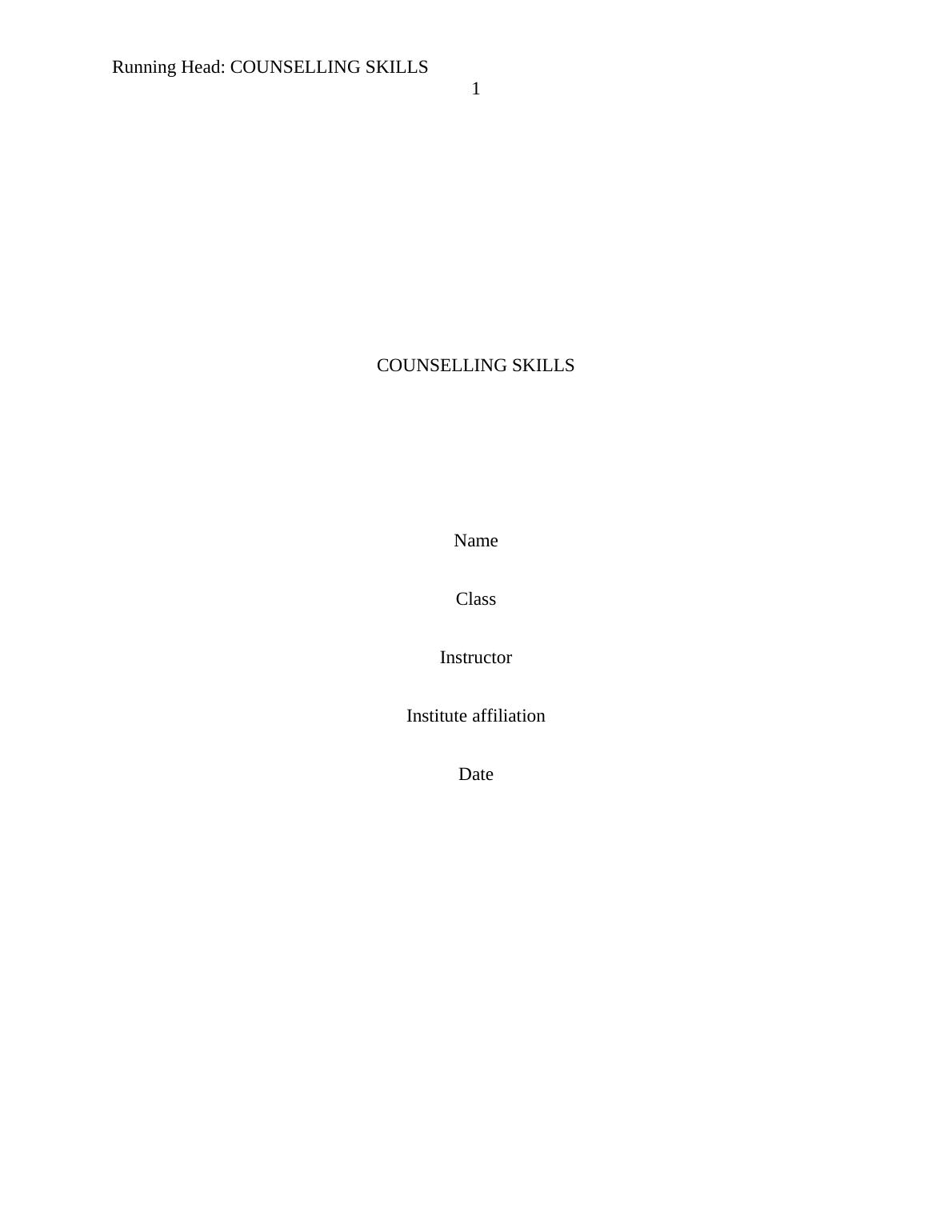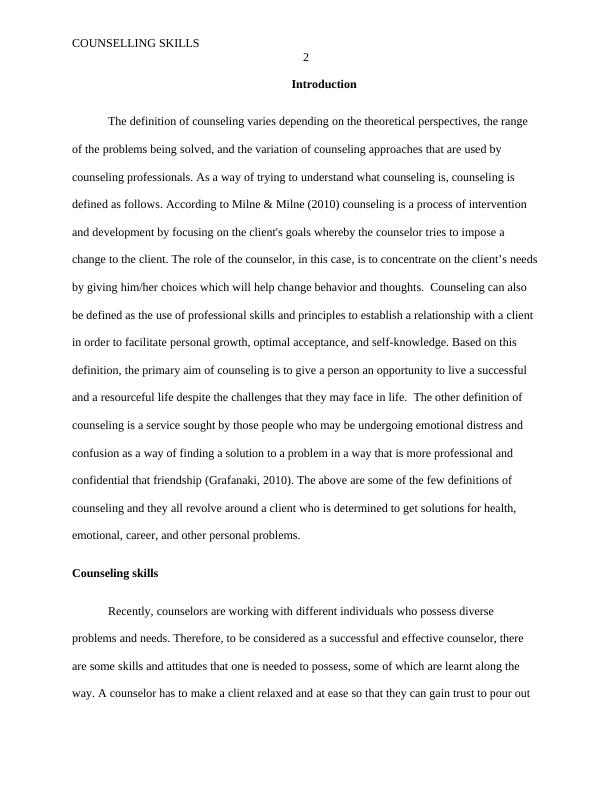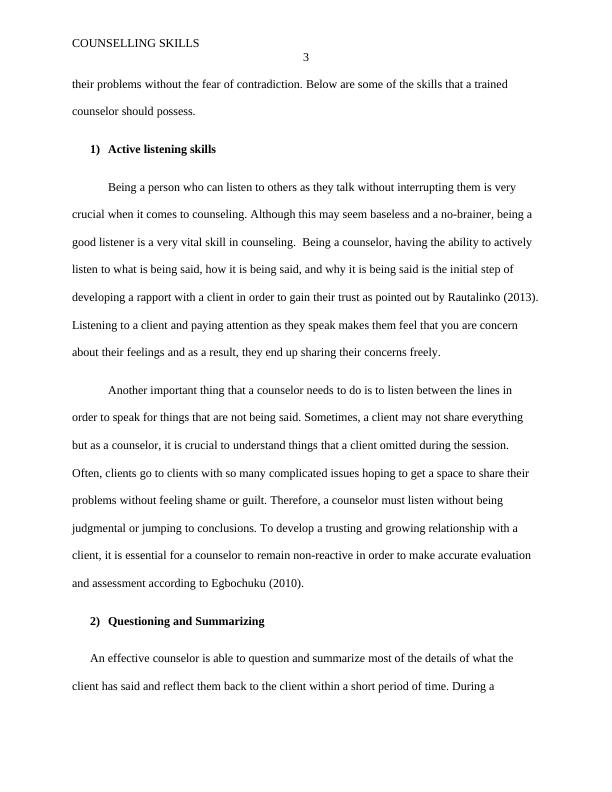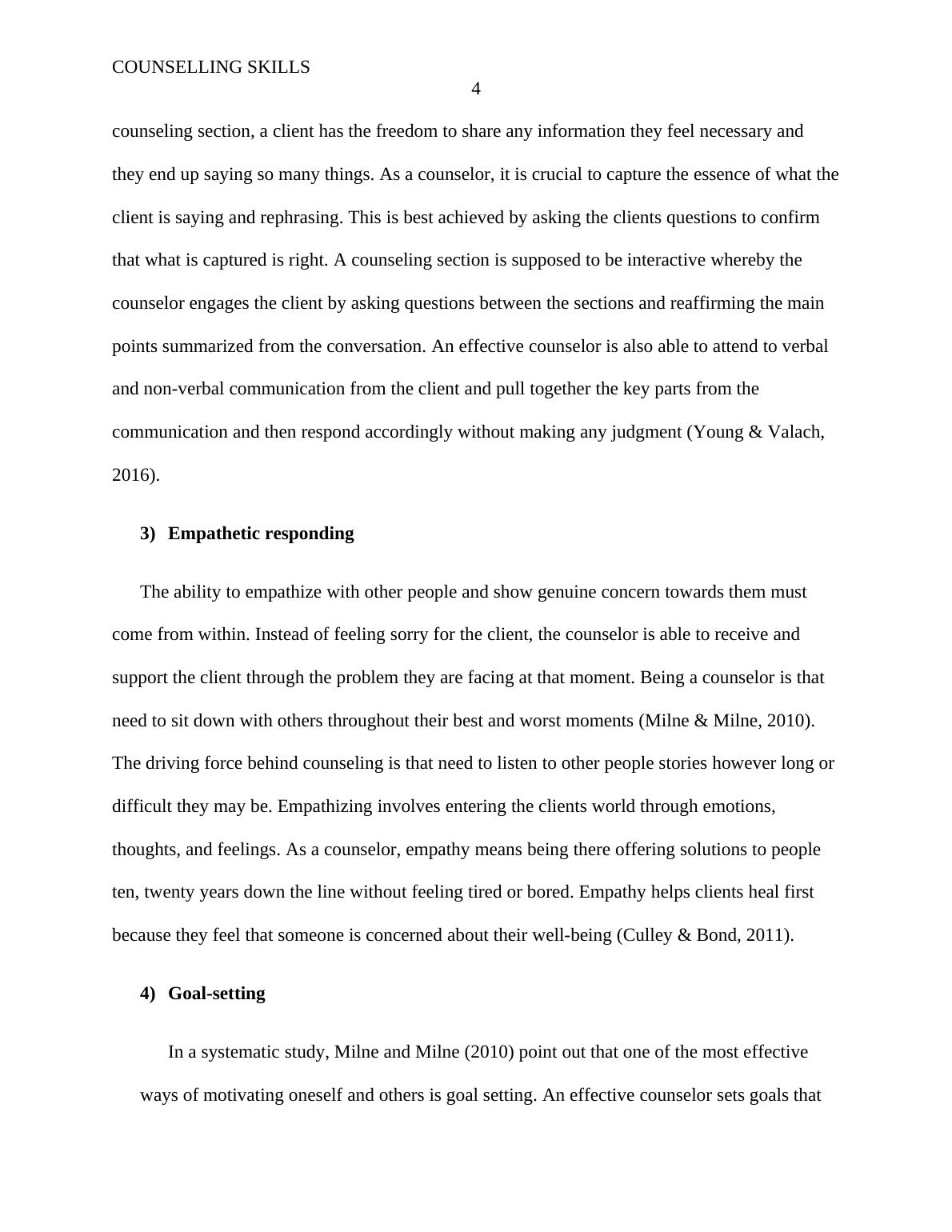Counseling Skills - Assignment
Added on 2021-06-15
13 Pages3364 Words139 Views
Running Head: COUNSELLING SKILLS1COUNSELLING SKILLSNameClassInstructorInstitute affiliationDate

COUNSELLING SKILLS2IntroductionThe definition of counseling varies depending on the theoretical perspectives, the range of the problems being solved, and the variation of counseling approaches that are used by counseling professionals. As a way of trying to understand what counseling is, counseling is defined as follows. According to Milne & Milne (2010) counseling is a process of intervention and development by focusing on the client's goals whereby the counselor tries to impose a change to the client. The role of the counselor, in this case, is to concentrate on the client’s needsby giving him/her choices which will help change behavior and thoughts. Counseling can also be defined as the use of professional skills and principles to establish a relationship with a client in order to facilitate personal growth, optimal acceptance, and self-knowledge. Based on this definition, the primary aim of counseling is to give a person an opportunity to live a successful and a resourceful life despite the challenges that they may face in life. The other definition of counseling is a service sought by those people who may be undergoing emotional distress and confusion as a way of finding a solution to a problem in a way that is more professional and confidential that friendship (Grafanaki, 2010). The above are some of the few definitions of counseling and they all revolve around a client who is determined to get solutions for health, emotional, career, and other personal problems.Counseling skillsRecently, counselors are working with different individuals who possess diverse problems and needs. Therefore, to be considered as a successful and effective counselor, there are some skills and attitudes that one is needed to possess, some of which are learnt along the way. A counselor has to make a client relaxed and at ease so that they can gain trust to pour out

COUNSELLING SKILLS3their problems without the fear of contradiction. Below are some of the skills that a trained counselor should possess.1)Active listening skillsBeing a person who can listen to others as they talk without interrupting them is very crucial when it comes to counseling. Although this may seem baseless and a no-brainer, being a good listener is a very vital skill in counseling. Being a counselor, having the ability to actively listen to what is being said, how it is being said, and why it is being said is the initial step of developing a rapport with a client in order to gain their trust as pointed out by Rautalinko (2013).Listening to a client and paying attention as they speak makes them feel that you are concern about their feelings and as a result, they end up sharing their concerns freely. Another important thing that a counselor needs to do is to listen between the lines in order to speak for things that are not being said. Sometimes, a client may not share everything but as a counselor, it is crucial to understand things that a client omitted during the session. Often, clients go to clients with so many complicated issues hoping to get a space to share their problems without feeling shame or guilt. Therefore, a counselor must listen without being judgmental or jumping to conclusions. To develop a trusting and growing relationship with a client, it is essential for a counselor to remain non-reactive in order to make accurate evaluation and assessment according to Egbochuku (2010).2)Questioning and SummarizingAn effective counselor is able to question and summarize most of the details of what the client has said and reflect them back to the client within a short period of time. During a

COUNSELLING SKILLS4counseling section, a client has the freedom to share any information they feel necessary and they end up saying so many things. As a counselor, it is crucial to capture the essence of what theclient is saying and rephrasing. This is best achieved by asking the clients questions to confirm that what is captured is right. A counseling section is supposed to be interactive whereby the counselor engages the client by asking questions between the sections and reaffirming the main points summarized from the conversation. An effective counselor is also able to attend to verbal and non-verbal communication from the client and pull together the key parts from the communication and then respond accordingly without making any judgment (Young & Valach, 2016). 3)Empathetic respondingThe ability to empathize with other people and show genuine concern towards them must come from within. Instead of feeling sorry for the client, the counselor is able to receive and support the client through the problem they are facing at that moment. Being a counselor is that need to sit down with others throughout their best and worst moments (Milne & Milne, 2010). The driving force behind counseling is that need to listen to other people stories however long or difficult they may be. Empathizing involves entering the clients world through emotions, thoughts, and feelings. As a counselor, empathy means being there offering solutions to people ten, twenty years down the line without feeling tired or bored. Empathy helps clients heal first because they feel that someone is concerned about their well-being (Culley & Bond, 2011).4)Goal-setting In a systematic study, Milne and Milne (2010) point out that one of the most effective ways of motivating oneself and others is goal setting. An effective counselor sets goals that

End of preview
Want to access all the pages? Upload your documents or become a member.
Related Documents
The Traits That Will Help You Thrive as a Counselorlg...
|8
|1709
|18
The Role of Basic Counselling Skills in Effective Counsellinglg...
|7
|1977
|81
Core Counseling Overviewlg...
|5
|679
|121
The Process of Counselinglg...
|5
|1107
|53
Case Study of Kirralg...
|11
|2564
|94
Counselling: Person-Centered and Cognitive Behavioral Techniqueslg...
|11
|2686
|355
